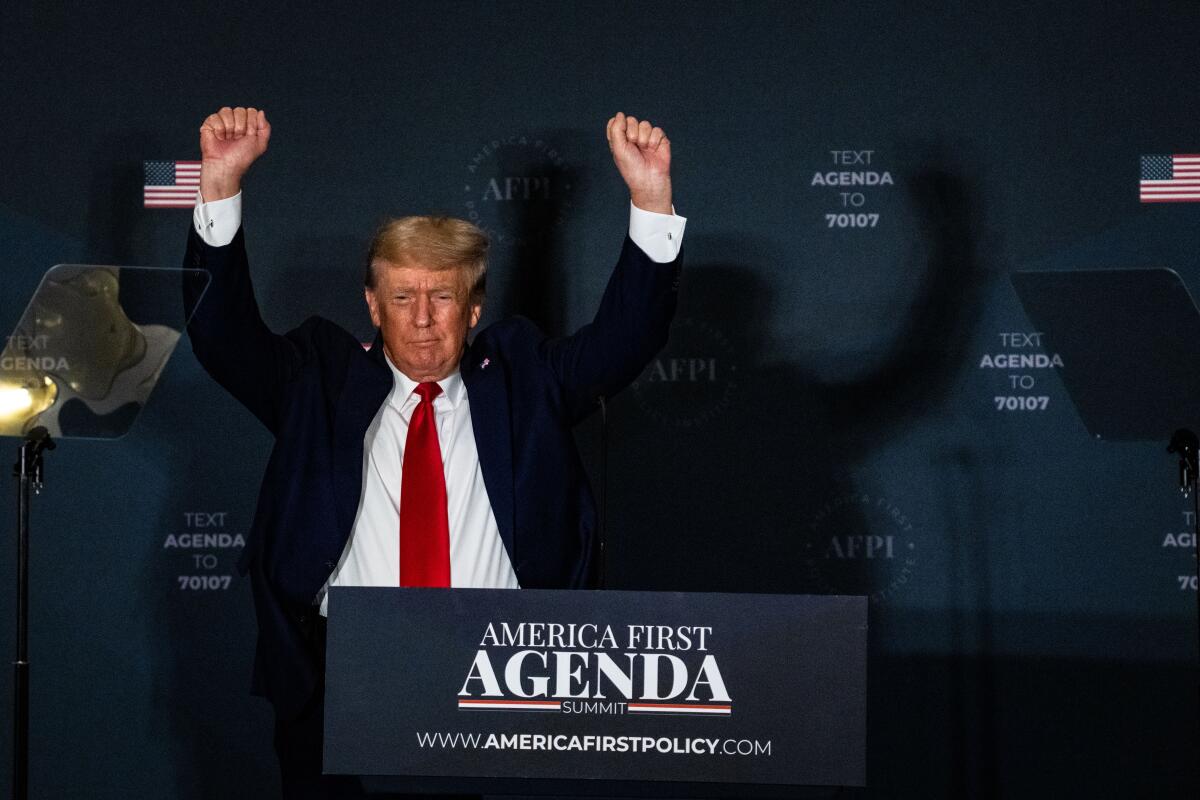Democracy’s survival depends on fighting demagogues. The GOP is embracing them

- Share via
The House select committee’s investigation of the Jan. 6 insurrection has hammered home a fundamental truth about democracy. This cherished form of government, rooted in the will of the people, can be upended by demagogues when political party gatekeepers do not block their ascent to power.
When gatekeepers fail in this critical duty, democracies deteriorate in a process well-known to political philosophers throughout history, including Alexander Hamilton. As he wrote in Federalist No. 1, such individuals achieve elected power by manipulating and dividing the people, “commencing demagogues, and ending tyrants.”
In other words, the first step in democratic breakdown is the election of a demagogue to power. Such a person, as Eric A. Posner explains in “The Demagogue’s Playbook,” is one “who obtains the support of the people through dishonesty, emotional manipulation, and the exploitation of social divisions; who targets the political elites, blaming them for everything that has gone wrong; and who tries to destroy institutions — legal, political, religious, social — and other sources of power that stand in their way.”
Once in office, the demagogue devolves into an authoritarian who subverts the government, corrupting and dismantling the democracy itself to retain power.
Donald Trump started out as a demagogue, and, as the recent House hearings show, he slid deep into authoritarianism, orchestrating an aggressive multifaceted campaign to overturn a free and fair election. What the United States and the world have witnessed over the past seven years since Trump announced his run for president is precisely the process of democratic deterioration that takes place when gatekeepers neglect to fulfill their duty to keep demagogues out of the executive pipeline.
Demagogues are as ancient as democracy itself, and, historically, watchful gatekeepers prevent them from seizing the bully pulpit and winning the public trust. Gatekeepers need to have eagle eyes for spotting this corrupting subset of political actors. Then they must work to sideline them by all means permissible, public and private.
Since the early years of the American republic, elected and appointed officials, judges, journalists and community leaders have assumed this gatekeeping role, but none of these compare in importance to the central role of political parties. In our system of government, each party has the crucial duty of defending the Constitution against demagogues. Before anything else, that means ensuring that a party’s presidential nominee demonstrates an unwavering commitment to free and fair elections and the peaceful transfer of power.
As Steven Levitsky and Daniel Ziblatt, authors of “How Democracies Die,” assert, “an essential test for democracies is not whether such figures emerge but whether political leaders, and especially political parties, work to prevent them from gaining power in the first place — by keeping them off mainstream party tickets, refusing to endorse or align with them and, when necessary, making common cause with rivals in support of democratic candidates.”
Some might protest that this gatekeeping by political parties is antidemocratic. But no system of government is perfect. That democracy can degenerate into tyranny through freely elected demagogues is an abiding paradox. It is democracy’s inconvenient truth — its greatest burden and most vexing dilemma.
Today, the Republican Party is duty bound to defend our democracy and Constitution against further assault by Trump. If the party of Lincoln does not stand up for candidates committed to free and fair elections and the peaceful transfer of power, it stands for nothing at all. Its failure to reject Trump resulted in institutional breakdown — and violence. And that is what will continue to happen if the party does not act decisively.
Recovery from the political trauma of the insurrection must begin with holding Trump accountable for his role in trying to overturn the 2020 election. But to safeguard our democracy from future presidential candidates who seek to take the same path, the leaders of both parties must embrace their duty to thwart such corrupt politicians at every turn.
Grasping this truth — that each party is responsible for counteracting its own demagogues — is a crucial starting point for rescuing American democracy from further decline.
Eli Merritt is a psychiatrist and political historian at Vanderbilt University. He writes the Substack newsletter American Commonwealth.
More to Read
A cure for the common opinion
Get thought-provoking perspectives with our weekly newsletter.
You may occasionally receive promotional content from the Los Angeles Times.









